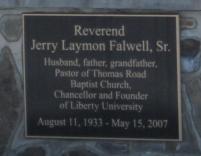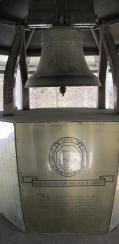Our next stop was the Liberty campus bookstore. It was run by Barnes & Noble, and it looked pretty much like any other campus bookstore. I was surprised by the range of books available there, some of which I would have expected to be verboten on campus – from Neil Gaiman’s American Gods to Jeff Sharlet’s The Family, as well as books on global warming and dream interpretation. That said, there were also four or five whole racks of shelves, a good half of the store, devoted to Christian material – Bibles, apologetics manuals, theology texts, proselytizing handbooks, and one shelf given over to books written by Liberty faculty, including the current president, Jerry Falwell’s son Jonathan.
This is a good place to comment on Liberty University’s code of conduct, the “Liberty Way“, which all students living on campus must obey (students who are under 21 and not married are required to live on campus). Among other things, it requires student groups to get prior approval from the administration for all on-campus speakers, demonstrations, and petitions, with the clear implication that permission will be denied if the activity would “compromise the principles and policies of Liberty University”. (Remember what Johnnie Moore said about “disputable matters”? Not too many of those in sight around here, it seems.)
Even more surprisingly, the code of conduct bans Liberty students from seeing any R-rated movies – even while off-campus. (I asked; there was a special exemption for The Passion of the Christ.) Also banned are any video games, posters or music whose content is incompatible with a “healthy Christian atmosphere” or not “in harmony with God’s word”. This is why it surprised me to find such books in the bookstore – although, like most totalitarian states, I’m certain that Liberty has many unwritten rules in addition to the written ones. It may well be that students are expected not to read or possess unorthodox books, even if the rules don’t say so explicitly.
Outside the bookstore, we came across this interesting little pavilion. I’m still not certain why Jerry Falwell chose the Liberty Bell as the symbol of his university, or why he named it “Liberty” in the first place. The Christian belief that Jesus provides “liberty” from sin may be part of it – but if that’s the reason, why use a secular symbol like the Liberty Bell, rather than a cross or something else explicitly religious?
This could, yet again, be an example of how the evangelical mindset so often values image over substance. Doubtless, it serves rhetorical ends to proclaim their love of liberty, even while the rules they impose on their students and faculty regarding permitted speech, correct belief and so on are the antithesis of this.
Last but not least, there was our visit to the on-campus memorial to Jerry Falwell. It was on a hilltop, set aside from the other campus buildings, behind the house that Falwell lived in while he was alive and that’s now used as an administrative center. There was a stone cross rising out of a reflecting pool, with an eternal flame on top, and a fenced-off plot of land watched over by a small bronze plaque. The snow was well-trampled, but in the chilly peace of that Sunday morning, my friends and I were the only ones there. On the far side of the memorial, someone with a less-than-reverent cast of mind had built a fort in the snow.
 |
 |
I shed no tears over Falwell’s death; he was a spiteful, small-minded hatemonger, and proud of it. And to judge from all the accounts I’ve read, Liberty reflected that attitude while he was in charge of it. For instance, The Preacher’s Son tells of several students being instantly expelled if they were even suspected of being gay; some of them were kicked out of their homes because of it, and at least one committed suicide.
Yet it does seem that Liberty has mellowed at least somewhat since Falwell’s passing. The Preacher’s Son also said that when the author attended Liberty, in the early 1990s, students were forbidden to see any movie or to listen to any contemporary music, even Christian pop; that girls were required to wear dresses or skirts; and that the administration put wheel locks on undergraduates’ cars to stop them from leaving campus without permission. None of those things still seem to be true today.
Make no mistake, Liberty hasn’t gone very far from its roots. It’s still a deeply conservative Christian fundamentalist college, still teaches its students young-earth creationism and the Rapture, still makes attendance at religious services mandatory, still engages in the policing of viewpoints and the monitoring of thoughts, and still views voting Republican as synonymous with Christianity. (As I was writing this, I heard that Americans United has asked the IRS to investigate Liberty’s tax-exempt status in light of the administration using the school newspaper, the Liberty Champion, to endorse political candidates.) But despite its origins, Liberty hasn’t been able to completely resist the tides of modernity, it seems.
But the problem is that even what’s moderate by evangelical standards is not moderate by the standards of wider society. From biology classes that teach creationism to law classes that teach Christian dominionism, Liberty is systematically deceiving its students about the facts of the world. And the old, ugly paranoia and hatemongering isn’t far beneath the surface either. And while, by the strict letter of the law, they have every legal right to lie and mislead, we likewise have every right to call this behavior what it is and denounce it. It seems a feeble weapon, but in the long run, no belief system is entirely immune to questioning.
